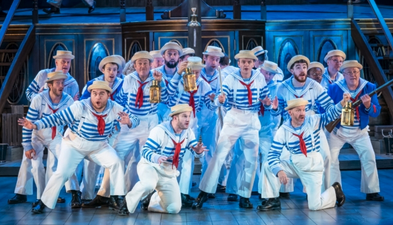- HMS Pinafore (London Coliseum) in rep to December 11
- The Magician’s Elephant (Royal Shakespeare Theatre, Stratford-upon-Avon) Runs to January 1, 2022
- What’s New Pussycat? (Birmingham Repertory Theatre) Runs to November 14, 2022
- Love and Other Acts of Violence (Donmar Warehouse) Runs to November 27, 2022
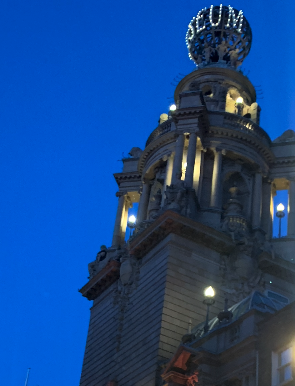
What an alternately serious and delightful pleasure it is to be back in the London Coliseum for English National Opera shows, after 19 months of its absence (though the theatre did house the on-off run of Hairspray during that time). This epic theatre is absolutely my favourite in all of London: it has grandeur but also surprising intimacy, with seats in all parts of the house offering great views of the stage. Critics routinely are given seats in the front to middle stalls, but when I returned to see Satyagraha again on its last performance there last Thursday, I was seated in the third row from the back of the dress circle in a seat I had paid for, and felt just as connected.
I had also been at the first night of Satyagraha, but owing to some pre-performance speeches from the CEO, artistic director, musical director and chair of the board, I’d had to leave at the second interval in order to make my last train home to West Sussex. I had tweeted my disappointment that night, even as I also spent part of the train journey re-booking to return. And when I ran into CEO Stuart Murphy last Friday, at my second consecutive at the Coli, he actually apologised for having made me have to skip out early.
It’s that sort of house: the CEO clearly pays attention at what is being said, even on social media. (It has also recently relaxed its rules on press seat allocations, too: while it was previously only offering press single tickets, so as to widen the scope of those that could be invited, we are now welcome to a guest ticket for new productions, which is also a more welcoming step).
During lockdown, director Phelim McDermott’s previous Philip Glass production for ENO, Akhnaten, was broadcast on Sky Arts in a version that was filmed when it transferred to the Met; I remember watching this extraordinary, exhilarating production on my lockdown television screen in abject despair. I was genuinely terrified that I might never get to see its like live again; I frequently wondered if theatre on this sort of scale would ever be achievable again.
Yet the return of Satyagraha proved that it has been and is. No wonder my frustration at having had to leave early the first time I saw it, but then my rush back to see it again on its last night.
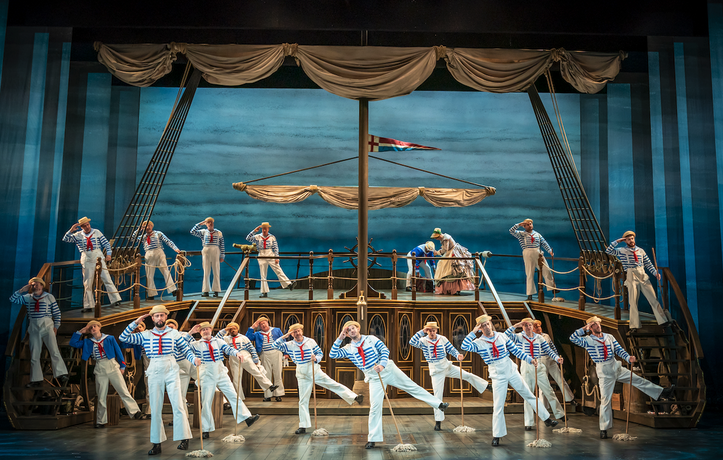
And ENO was then, the very next night, to go from the sublime to the intentionally ridiculous, as it premiered a new production of Gilbert and Sullivan’s HMS Pinafore, directed by Cal McCrystal who had previously staged G&S’s Iolanthe for the company in 2018. That followed earlier G&S outings by the company that included Jonathan Miller’s long-running (and still revived) production of The Mikado (premiered in 1986) and a 2015 production of The Pirates of Penzance, directed by Mike Leigh who had also directed the G&S bio-film Topsy-Turvy.
HMS Pinafore turns out to be a riotous delight, an utterly shipshape production that is rendered with a nearly continuous stream of laugh-out loud funny moments by director Cal McCrystal. Some may frown — the laughs sometimes bury the music — but it’s both lavish and immensely stylish, with witty, spectacular sets and costumes from takis, that make it a visual as well as musical treat.
There’s a running gag in that’s reminiscent of one in One Man, Two Guvnors— whose physical comedy was also the work of McCrystal — that may be at the expense of the old and infirm, but had me once again helpless with laughter. Lizzie Gee, whose choreography for the all-male G&S shows at Southwark’s tiny Union Theatre were a particular treat of those, brings the same knowing camp to this much larger space. ENO may well have another reliable hit to add to its repertoire.
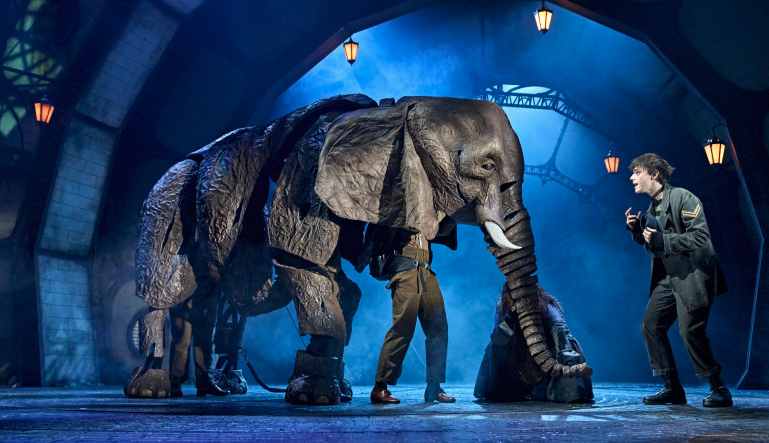
Alas, the RSC can’t say the same thing for its new family Christmas musical, The Magician’s Elephant, which re-opens the Royal Shakespeare Theatre in Stratford-upon-Avon after some 19 months of closure. It’s the same slot that famously produced Matilda, Tim Minchin and Dennis Kelly’s adaptation of Roald Dahl’s story, now in its 10th year at the West End’s Cambridge Theatre where it reopened on September 16 after its 18 month pandemic shutdown. Of course hits like that are once in a generation; the RSC’s previous blockbuster Les Miserables had occurred some 25 years earlier. The Magician’s Elephant is dressed to the nines — and has a 10/10 life-size puppet elephant — but it ends up with nowhere to go, which sadly may be its fate. It’s a sweet, warm-hearted Christmas show, but despite a few lovely tunes by composer Marc Teitler (who also co-wrote the lyrics with book writer Nancy Harris, adapted from Kate DiCamillo’s 2007 novel), it won’t linger long in my elephantine theatrical memory.
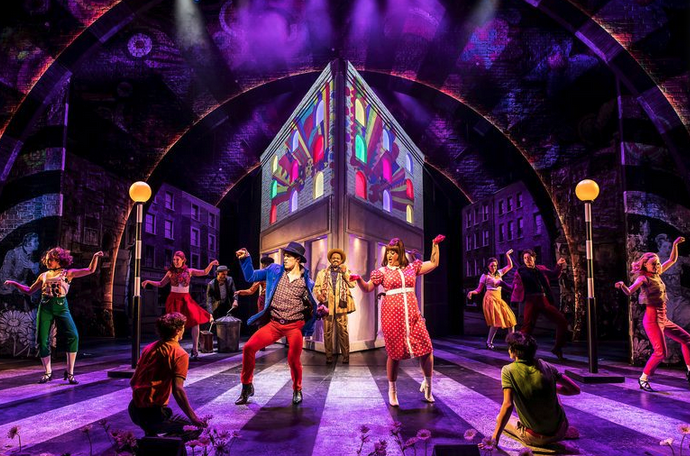
At least it’s an original musical with a new score. Less than an hour from Stratford-upon-Avon, Birmingham Repertory Theatre is the scene for a try-out of yet another bright, colourful jukebox confection, What’s New Pussycat?, that improbably maps the song catalogue of Welsh troubadour Tom Jones to the story of Henry Fielding’s 18th century romantic chancer, all relocated to the 60s.
It is directed by Luke Sheppard, who similarly folded the songs of Swedish pop writer Max Martin into a contemporary updating of Shakespeare’s Romeo and Juliet to become & Juliet (that recently resumed performances at the Shaftesbury; it is now boasting that it is about to celebrate its 2nd anniversary there, which is technically correct in terms of when it first opened in November 2019, but given that it has been forced shut for some 18 months by the pandemic, that’s a bit of an exaggeration).

Like & Juliet, What’s New Pussycat? won’t win any prizes for subtlety, but it sledgehammers the songs into a narrative, devised by Joe DiPietro, with an infectious sense of fun and charm, led by dashing Dominic Andersen and clarion-voiced Bronté Barbé (pictured above) in stylish form.
Arlene Phillips provides the delightful period choreography, Jon Bauser the witty set, Janet Bird the irresistible 60s costumes and Gareth Owen the superb sound for a West End-ready show; is may sizzle there, but would it sell? Does a Tom Jones musical without Tom himself in it have enough to attract the fans?
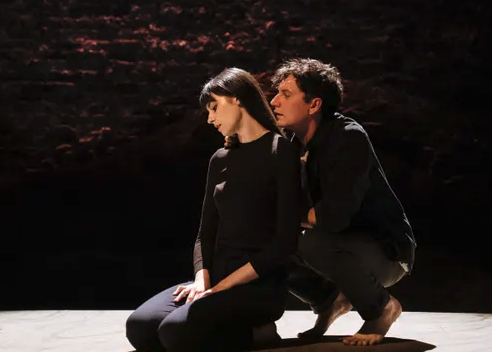
Finally, Cordelia Lynn’s bleak, sparse Love and Other Acts of Violence — a Donmar Warehouse commission — has re-opened that Covent Garden powerhouse in uncompromising, discomforting style. Part dystopian romance, part cautionary historical reminder, it is set in the near future in the first part, then the past in second, to establish grim parallels of the human cost and impact of anti-semitism across the ages. It is haunting, harrowing and disturbing.

